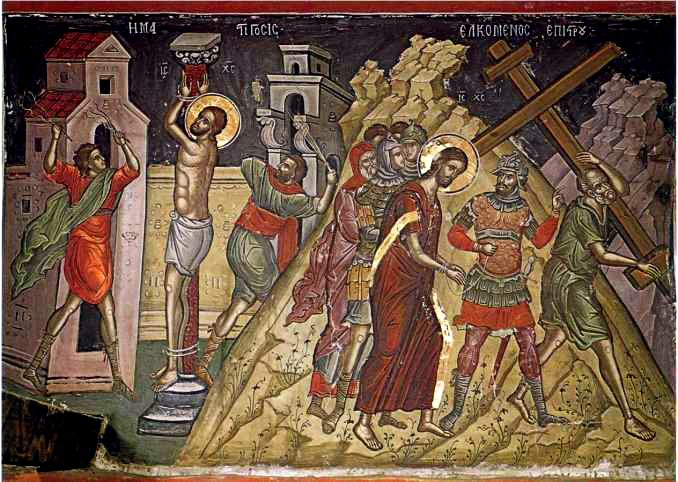Greeting once more friends!
People have come to know about God’s Triune nature through this Bulamanriver blog posts. Others have come to the knowledge of God by other means – through the Bible, through people, through books, through a local church, other media forms, and so forth. But how many know how to relate with the God of the Bible? He seeks to relate with man, but how do we relate with Him? We relate with people in different ways, depending upon our affiliation and the kind of bond we have with them. We do not relate with people the same way. There is a way we relate within those in the circle of one’s family. Then, within the family there’s even sub-relational bond like spousal, children, the extended family, and so forth. Outside the home, we have professional relationship at work. Then there’s another we develop in society that’s social in nature. We have friends that’s different and special to our relationships. There’s a relationship we develop with our immediate neighbors, and the community at large. Then it extends to the very nation of which we are all citizens, whatever the country may be. In other words, you form relationship ‘protocols’ for different associations with people. There is one underlying motivation which ought to govern all our relationships however different they may be. And there is a way to relate with God. That’s what I will share in this post.
![]()
Rublev’s famous icon of Holy Trinity (Wiki Commons)
God Is Trinitarian
Readers of this blog will know by now how I have attempted to explain the nature of God in my blog posts. This is important because a right relationship with God can’t be formed until we have a true and proper understanding of His nature. I will not explain the nature of God at much length except to refer you to my past blogs where I have dealt with this topic at some length. (“Life Begins Where Our Concept of God Takes Root,” Parts 1-3, May 2013) In short, God is Trinitarian, not “solitary.” God is therefore Father, Son, and Holy Spirit. He is Three yet hypostatically One. God is Love by hypostasis making three separate Persons relationally and indivisibly One. (1 John 4:8) What I share in this blog is the relational ‘etiquette’ we bring into our relationship in His Triune Being.
Friendship!
Relating with God is like relating with a very close intimate friend. When we treasure a person’s friendship we do everything to keep and grow the bond of that friendship. You would go to extra length to find out all you can about him or her. You find out your friend’s likes and dislikes, so you’ll not do anything to hurt, but cultivate and make the relationship flourish. You find out about the person’s family and friends and get to know them better. In a way, you form a ‘friendship etiquette’ or protocol that’s reserved only for that friend, which you do not extend to others. The Bible says, “There’s a friend who sticks closer than a brother.” (Pro. 18:24b) So, sometimes friendship can be closer than family. Friends are important relationships to a person. But more than friends, God goes a step further and regard us as family as well. He Loves us dearly and would not spare any pains to form a lasting family relationship with us.
First Things First
When it comes to our relationship with God, the first observation is that relationship begins with Him – He existed in relationship as the Father, Son, and Spirit, and extends the hand of relationship to humans – not the other way round! The Bible tells us that He first Loved us which makes it possible to Love Him in return. (1 John 4:19) That’s the first ‘protocol’ to observe. That’s obvious because He is Creator, and He made man in His image so He can develop a relationship with humans. This relationship He desires with man is the same kind of relationship God has from eternity in His Triune existence as Father, Son, and Spirit. Every human being derives his personality from the Triune Being of God in the Persona of the Tri-Personal God. They exist as Three free Persons who choose to be One in the bond of Love, and desires to have the same kind of existence with humans. (Gen.1:26-27)
Man Just Doesn’t Have It!
Here is man’s predicament in this relationship with God. God’s holiness in His unfeigned Love is what man in his sinfulness is incapable of responding because he does not have the same divine Love. Man just does not have the equivalent Love to relate with God. So there is this unbridgeable chasm which exists between man and God which prevents a relationship from being forged. It’s not as if God did not offer it to man, it was offered to him in Eden, but man rejected it for a life of fear instead of His Love by rebelling. And fear has been the dominant factor in man’s life he inherited since Adam’s eviction from Eden because of his sin.
“I am the Way…”
God’s answer to restoring the relationship, and the only way, is through the second Adam, Jesus Christ, His Son. All humans find themselves in this spiritual bondage which he cannot extricate himself. Jesus, who is Himself God as the Father and the Spirit, and who possesses the same divine Love, is the Person God gives man to restore the relationship. Thus, He is qualified to mediate and represent man in making man’s union and relationship possible. Jesus, by taking upon Himself His human body and our humanity, effectually joined mankind to the divine Godhead in substance and reality. Jesus took our humanity through His human body into a glorified state by His perfect life, sacrificial death, His glorious resurrection and ascension into heaven, and becomes our Mediator in His High Priestly role. Man can now Lovingly relate with God on equal terms in and through Jesus. That’s how God extends His hand of relationship with all humans, and by which man responds with the same Love protocol back to God. This is the only way, and this is the plan of God for man to enter into a relationship with Him. In this regard, Paul speaks of “putting on Jesus” as if being ‘cloaked’ in His very glorified humanity thus enabling man to enter and live this Triune existence of Love with the Trinitarian God (Gal. 3:27).
Intimacy In The Triune Life
The nearest human institution that can compare to living the Trinitarian life is the family and the home. In reality, the family was originally given at creation to forever remind humanity of the Life of the Tri-Personal existence of God, after whom the marriage institution received its legitimacy. Recall that the institution of marriage was given to man before Adam’s fall. It’s the only relationship given to man to reflect Himself in His Triune Being, when man was at One with God before Adam’s eviction from Eden. So, marriage and home is the byproduct of the Trinity. Paul said, “I kneel before the Father from whom every family in heaven and earth derives its name.” (Eph.3:14-15) Of course, the modern family is far removed from the model God has set for it from the beginning, nevertheless, it is through life in the Trinity that we will begin to taste God’s plan for the family He ordained and made for humanity. The home is a place where Love and intimacy is the glue which holds together all the persons who make up the home. It is not an institution like that of a business where the people relate through functions and as associates. In the home, the human ‘personhood’ is of paramount importance for it reflects the Tri-Personal Being of God. This should be the case with every other non-familial institutions, for what occurs in the home ought to be replicated in all of life’s expression.

Dove – Symbol of Divine Love (Wiki Commons)
Love is Key
In the Trinity, as it should in the human home, the relationship of the personalities in the family works optimally only when Love is given and received. Love is the ingredient which engenders a healthy and generous relationship within the home. Love is what makes the marriage more than an institution – it makes marriage a home. The home is a world where privacy, security, and Love is dispensed, and where one is protected from the machination of a malevolent world. When a believer lives the “Triune Life” he or she is at home because of God’s Love – for “God is Love.” (1 John 4:8)
Christ and The Church (You)!
Paul tells us that marriage is like the relationship between Christ and the church. (Eph.5:25) Just as Love and intimacy is the bond of marriage, so it is with our relationship with the Triune God through Christ. Just as the marriage commitment (covenant) protects the private intimacy between two people, so it is with a person’s relationship with God. The marriage of the church to Christ is protected by the New Covenant agreement. (Heb.8:7-13) The church is not a building, but comprises of people – you and me! In it, God makes certain promises, and, they involve God’s “heart.” He says He will give us a heart to Love Him faithfully. (Heb.8:10) When the heart is involved intimacy comes with it. We don’t give our hearts to someone without intimacy being central to its expression. Entering the “Triune Life” means we have given our hearts for intimate relationship with God. Intimacy is the expression of the inner sanctum of a person’s heart – the most private and ‘secret’ shared with another only in a marriage. Intimacy is not ordinary relationship, but it is protected through restricted access, hence, the Love-bond through the marriage covenant.
Ulterior and self-centered motives harm the relationship, and ultimately destroys the marriage and home if not remedied. Idolatry, considered “playing the harlot” in the Bible, destroys intimacy with God because intimacy is shared with other gods. It is spiritual adultery. (Exo.34:15-16; Deut.31:16-17) Peter said, “You have tasted the kindness of the Lord.” (1Pet.2:3) The Psalmist declares, “O taste and see that the Lord is good.” (Psa.34:8) God has been intimate with us in His unconditional Love for us. When we have tasted His Love, it is only natural to reciprocate in equal intimate response. We have the ability to be intimate, because He has been intimate with us first, and intimacy is the prototypical model found only in the Trinity. (1 John 4:19) The Spirit gives us the heart to be filled with gratitude for what He has done. His first act of Love from which the Father will display His creative powers in human life thereafter, is to not withold His Son, but freely sacrifice Him for man so the relationship can be restored. Love is self-sacrifice, and it is in this intimate environment of Love that we joyfully enter and live the “Triune Life” through Christ.
The 6 ‘Etiquettes’
How does a family remains strong, stable, and secure, where all members of the family can find meaning, purpose, strength, and happiness within the home and outside of the home? A family exist to fulfill the needs of all members of the family in self-giving Love. How each family member is nurtured most effectively depends upon its structure. There are six Love-motivations that form a healthy family structure. Let’s call them Love ‘etiquettes.’ They are 1) communication, 2) boundaries or rules, 3) self-sacrifice, 4) goals, 5) leadership, and 6) encouragement. Everyone who makes up the family has to have a clear understanding how each play a role, and gives himself or herself to that role, in these 6 areas which form the family home structure.
There is transparency governed by open communication with each member of the family. Each is knowledgeable of the boundaries for family practices and customs. There are times when family members are called upon to make sacrifices for the family. Each member has to have a worthwhile goal to achieve a life that’s suited to the person’s gift and purpose. Of course, all these cannot happen unless there is leadership and encouragement provided in the family by the parents, in particular, the father.
In the exact fashion, the Triune God is a family of three members, and extends a hand to man to join in and participate in their Life. Our relationship with the members of the Triune Family is no different. It is too bad that we have turned the family motivations and ‘etiquettes’ mentioned above into practices that have become overly religious and legalistic, that it has lost all its meaning and impact. We need to refer to them as terms of endearment, because these are Love ‘etiquettes’ we display in the “Triune Life.” What are these?…Note their counterparts: Communication is prayer; boundary is the Bible; sacrifice is obedience and fasting; goal is our calling and meditation, leadership is vision; and encouragement is praise. These everyday common sense functions have been cloaked in religious terms for the legalist’s own ends. When we put them side by side like that, we can unwrap the religious and legalistic undertones they convey. Some have even call them “disciplines.” When we regard them as “disciplines” they are viewed as something forced upon us. No, these are Love “etiquettes” accepted by all as something we joyfully participate because Love is central in the relationship. We Love being part of the home because we see what Love does to all concerned. When all is said and done, there is no place like home, and we would gladly give our life to this relationship.
In my next installment I will get into the details of the 6 Love ‘etiquettes’ of life in the Trinity.
Blessings:
Until we meet again in my next post, may the blessing of the God who ceaselessly expresses Himself in His dependable Triune Love, be with you today and give you strength for authentic creative Triune Living as a Bula man-river.*
If you have any questions, please do not hesitate to write me in the space provided below, or email me on bulamanriver@gmail.com.
Kiang (Your Servant in Christ)
*The “Bulamanriver” is the metaphor describing the union of man with the Love of the Triune God flowing in humans, making possible the “Triune Life” – the source of the miraculous life in man. Man is the “riverbed” and the Spirit is the “living waters” that cover him and flows to all in his valley (destiny). (John 7:37-39)
All scriptures are taken from the NIV Version 2011, unless stated otherwise.
NOTE: All information from this website is copyrighted. Any use of its content should be acknowledged by citing the website, address, date of acquisition and information pertinent to original authorship.





